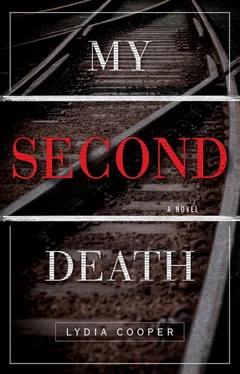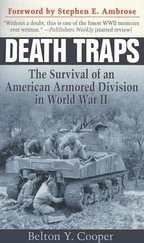The detective’s fingernails are squared off, blunt and lacquered shellfish pink. She taps the nails of her first two fingers and her thumb together. She comes over to the table and takes the cup.
“You want tea? I can get you some.”
“No. No, thank you.”
She nods and takes the cup. Sips. She presses her lips together to dry them. She sits down. “You know why we brought you in?”
“Because I ran — I mean, I contaminated—”
She smiles and shakes her head once. “That doesn’t matter. You didn’t go into the crime scene itself. But you seemed pretty upset. Did you know her?”
“Know—?”
“The woman. Do you know the victim? The woman on the chair?”
It occurs to me that it would be entirely helpful at this point to be able to roll names off my tongue with the ease with which I can parse Old English syntax.
But names don’t mean anything, except as methods of psychological control. I read a study that said we call people names — and you can see this in nicknames, but it’s true in general, too — so that we have a handle for them. So that we can own them.
What, besides a name, do we ever really know about a person? About a family member or a friend you could say something, maybe, some personality trait or great deed that belonged to them alone and that defined them.
But all I know of Desiree are the things she carried with her. And that she was a person underneath it all, and that she respects the dismembered dead.
“She is someone’s mother.”
The detective sets the tea down. “What was that? Whose mother?”
“I don’t know. But she could be. She could be anyone’s mother.”
The detective reaches for the cup again. She sips her coffee and watches me above the Styrofoam rim. “Theoretically, I suppose so. Do you know for a fact that she is a mother?”
“No.”
“How do you know her? Is she an acquaintance? Someone you’ve seen her around?”
“Around where?”
“Anywhere.”
“I didn’t look at her face for very long.”
“Mm. But you started yelling before you saw her. You got out of your car and came running across the lawn yelling. Were you worried about her?”
“I told you — I mean, I’m telling the truth. I don’t know her.”
“Did you know she was inside the apartment? You seemed very intent on getting into the building.”
“No, it was — it was because of the fire.”
“The fire?” She sets the cup down again and puts her palms on the table. She leans forward. The tops of her freckled breasts press out against a cream-colored buttoned shirt.
“The house across the street. I saw the ambulances and police cars and thought of the fire.”
“You thought there might be a fire?”
“No. No, it just, it looked like when the house across the street burned.”
“And so you went running toward the house?”
I look away from the detective. “There was a body in that house that burned. They brought out a body on a stretcher. And I thought someone should see—”
The silence goes on for a while.
“Should see what?”
I pull my gaze back to her dark eyes, but her pupils are fixed, the muscles around her mouth and nose tense and I can’t read her face.
“If there was someone in the apartment, too.”
A tap at the door.
She pushes off the table and smoothes a strand of hair behind her ear as she goes to the door. She opens the door, and I smell sweat and beef. I look over my shoulder. A blue uniform shoulder. They talk in low voices. It is a man.
The detective comes back in the room and the cop follows her in.
“Miss Brandis, do you recognize this officer?”
I look up at the cop, my eyes tracing up his body. A hand gripping his belt, the knuckles dimpled, a mist of dark hair across the knuckles. His uniform is neat, but wrinkles crease next to the buttons where his belly strains at the fabric. His eyes, I notice for the first time, are fanned by fine wrinkles, and the irises are the color of hazelnuts. He scratches his cheek and his fingers rasp on bristles.
“Yes,” I say.
“You do?”
“Yes.”
“He says he recognizes you from his investigation of the fire.”
I remember his face when I stood in front of him naked. The way his eyes tried to fall, his eyelids to cover the pupils, to veil his shame, or mine. I let my own eyes drop now, my eyelids descend.
“Yes.”
“I’m sorry, could you speak up?”
“I just said yes.”
“Do you remember running toward the fire?”
The cop clears his throat.
The detective looks over at him. She links her fingers loosely and raises her eyebrows. Her facial muscles are relaxed, her shoulders are back.
“You acted like you knew who was in that fire, too,” the cop says. He clears his throat, a harsh rearrangement of phlegm. “You seemed pretty excited.”
“I didn’t,” I say. “I just — the fire—”
“You like fires?” The detective taps her finger on the edge of the table. Acrylic ringing on metal. “And ambulances. Emergency vehicles. They’re exciting, aren’t they? You like to get involved. Pretend you’re part of it all. You like the feeling of — what is it? Risk?”
I swallow. “No.”
They both look at me. The room is warm. The uniformed cop touches his neck, runs a finger around his collar. A bead rolls down his neck. The detective remains still.
“No,” I say. “Maybe. It’s not that, it isn’t. I have a, a thing, like, a condition.”
“Condition,” the detective says.
“I’m sorry,” I say because it seems the sort of thing people say in such situations.
The detective’s fingers unfold. She says, “We just have a few more questions. No one is accusing you of anything. We’re just going to ask and you can tell us the truth. Did you kill the woman?”
“No.”
“Where were you coming from, when you drove up?”
“Home. A party. My parents—”
The cop says, “I just talked to—”
“Thank you,” the detective says. Her tone is sharp. The cop wipes a finger over his upper lip. I realize that they have called my parents. They have heard what alibi I have.
I let my spine touch the back of my chair.
The detective asks me more questions. Her tone remains even when addressing me. After a while she says, “Thank you for your help, Miss Brandis. We may have more questions. You will have to remain in the Akron area for a while. You understand that, right?”
“Yes.”
“Okay.” She gives me her card. Says to call her if I see anyone I don’t recognize around the apartment.
The cop takes me upstairs. He doesn’t touch me but when I stand at the desk collecting my wallet, car keys, office keys, and the few coins that had been in my pocket, he clears his throat. “Do you have someone to come pick you up? You want to make a phone call? I can take you home but—”
I look over at him.
He wipes his palm over his mouth. “You need a phone?”
“I don’t like riding in cars with people.”
“I know,” he says. “I figured. So you want to call your friend, or, or anyone else?”
“I mean, you’re being nice to me. But you don’t have to. I’m not retarded. No rule in the Boy Scout handbook about being nice to crazies.”
He looks at me and then he says, “Yeah. You doing okay? With all that in there, you okay with that?”
“Yes.”
“All right. Well. You going to make that call?”
“You can take me home.”
“Oh,” he says.
“I mean, it’s okay if you take me home. If I can sit in the back. Behind the window.”
He smiles suddenly. “Okay,” he says. “That’s okay. You just let me know if you need out or anything. The doors don’t open from the inside.”
Читать дальше












